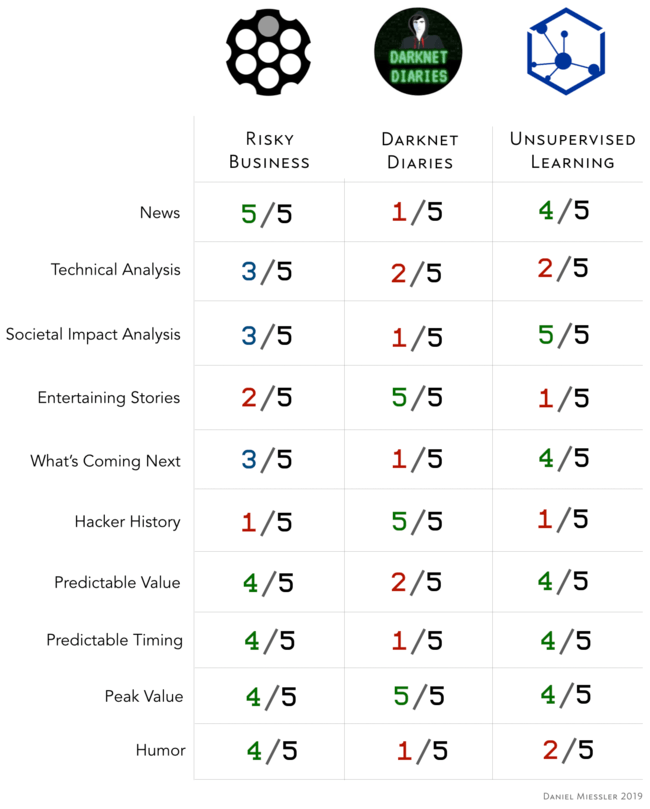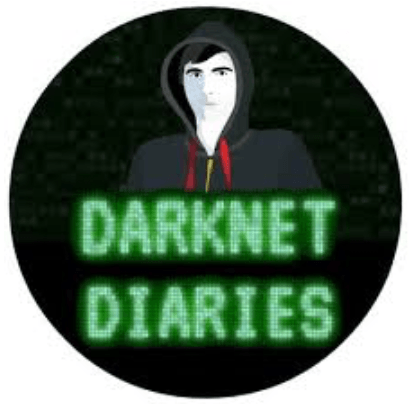My 3 Favorite Security Podcasts, And How They’re Different From Each Other

What I like so much about the podcast world is how two shows can cover mostly the same material, but be wildly different.
The world of security podcasts is like this, with my top three recommendations having completely different tastes and textures.
I wasn’t going to recommend my own show, but then I realized that if I wasn’t willing to recommend it then I shouldn’t be doing it.
For podcasts, structure and delivery is just as important as content.
Here are my three go-to recommendations for security-related podcasts. There are many other excellent options; these are just my foundation starters.
Different show, different offerings
As you can see here, it’s not about which show is better—it’s about which show is offering the mix of content and style that you prefer. I created this matrix just now using News, Technical Analysis, Societal Impact Analysis, Entertaining Stories, What’s Coming Next, Hacker History, and Humor as my categories.
Predictable value and timing are about having known sections that you can jump to or skip to hear what you like.

Because the shows are so different, I know many people who love or hate them because of one particular aspect. Some people can’t stand humor, or can’t listen if it isn’t funny. Others tune in or out based on the voices and personalities. Some listen for content alone, and others listen to hear the people.
Here’s more on each of the three.
1. Risky Business >

Adam is a long-time pentester with tons of deep knowledge on offensive security.
Risky Business is my favorite technical security news podcast. Patrick > and Adam > cover a lot of stories in a decent level of technical detail, with a solid dose of humor and snark as well.
They also have the best vendor coverage of any security podcast, with Patrick doing regular (paid but honest) conversations with various handpicked vendors. It’s quality.
2. Darknet Diaries >

Darknet Diaries is instantly engaging to almost any audience, kind of like Serial on NPR.
Darknet Diaries is a phenomenon. Despite being around for the shortest amount of time, it has download numbers that mini-me the other two shows on the list.
What does it for me is the way Jack > combines extraordinary hacker stories with unbelievable production and style. And when I say production, I don’t just mean audio and such, but a super clean narrative that seriously matches what NPR does with a massive staff.
3. Unsupervised Learning >

Patrick calls my show a "thinking" podcast, which I thought was both accurate and a compliment.
Unsupervised Learning is my show, and it’s best described as news and analysis around how security and technology affect us as humans.
So the main themes tend to be security related, but it’s really about humans, society, and how they’re all being affected by all this technology.
Comparisons
This is why I recommend these three in particular—because they offer completely different content, delivered in a completely different way.
Risk Business gives you news, vendors, and humor.
Darknet Diaries gives you entertainment, history, and intrigue.
Unsupervised Learning gives you security, tech, and analysis of how they affect humanity.
Strong endorsement.
If I had to have someone listen to only ONE security podcast, it would be Risky Business.
If I had to give someone a show to get them interested in hacking and security culture, it’d be Darknet Diaries.
And if someone wanted to know what’s happening and coming next in security and tech—and what we should do about it—I’d point them to Unsupervised Learning.
Summary
It really does come down to what you’re looking for in a show, where you are in your career, the types of personalities you like, and what other interests you might have outside of security.
But these three are a great start.